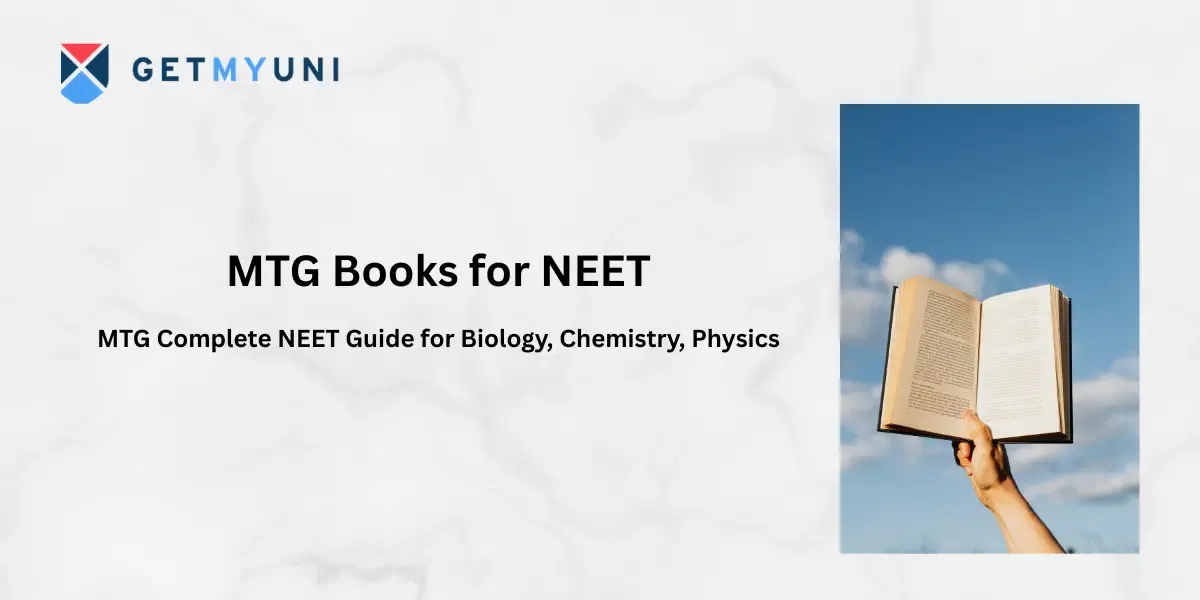This article provides a structured 8 months study Plan for NEET 2025 along with weekly and daily preparation timetables, important topics, syllabus breakdown, best books, and preparation tips to help you ace the exam.
NEET UG 2025 is one of India's most difficult competitive admission tests. To succeed in the NEET exam, students must have an 8 months study plan for NEET 2025 in place.
To start preparing for NEET 2025, familiarize yourself with the exam format, syllabus, and essential subjects: Physics, Chemistry, and Biology. Create a personalized study plan based on your strengths and areas of improvement. Set aside specific time for each subject to ensure a thorough approach.
Consistent practice with mock exams and NEET previous years' question questions will help you improve your exam performance. Keep up with the latest NEET 2025 exam trends and any modifications made by the National Testing Agency (NTA).
Continue reading the article for a detailed 8 months study plan for NEET 2025, including weekly and daily timetables for a well-structured approach to help you stay focused and fully prepared for the exam.
Overview of NEET 2025
NEET 2025 is a very competitive medical entrance exam held during the academic year 2025-26. It is organized by the National Testing Agency (NTA) and is the primary path for admission to India's undergraduate medical schools.
Before knowing the 8 months study plan for NEET 2025, the table below summarizes significant aspects of the NEET 2025 exam.
| Particulars | Details |
| Exam Name | National Eligibility cum Entrance Test (NEET) |
| Conducting Authority | National Testing Agency (NTA) |
| Exam Date | May 4, 2025 |
| Courses | MBBS, BDS, Nursing, AYUSH |
| Exam Level | National Level Exam |
| Exam Mode | Offline (Pen & Paper Based) |
| Age Limit | Minimum 17 Years |
| Number of Candidates Appeared (2024) | Over 24 Lakh |
| Exam Frequency | Once a Year |
| NEET Website | neet.nta.nic.in |
Also Read: Time Management Tips for NEET Exam
8 Months Study Plan for NEET 2025
A planned study strategy is required to prepare efficiently for NEET 2025. This 8 months study plan for NEET 2025 gives a clear path from laying the groundwork to rigorous review and finalization.
Following this strategy will help you organize your time effectively, cover all required topics, and enhance your problem-solving skills, allowing you to achieve a good exam score.
Month 1: Foundation Building
- Build a solid foundation by knowing the NEET 2025 syllabus and exam pattern.
- Download the NEET 2025 Syllabus. Thoroughly review the NEET 2025 syllabus from the NTA's website.
- Sort subjects based on familiarity and difficulty level.
- Collect crucial study resources, such as NCERT textbooks and NEET-specific reference guides
- Create a realistic daily and weekly study schedule to help you manage your time efficiently.
Month 2: Preliminary Preparation
- Start with fundamental principles and easier themes to gain confidence.
- Set aside time each day for Physics, Chemistry, and Biology.
- Concentrate on learning the essential concepts in each discipline.
- To lay a firm foundation, start with things that are easier to understand.
- Take brief notes and mark crucial points for easy revision.
Month 3: Deep Study of Subjects
- Address more complicated themes and improve your knowledge of NEET 2025 subjects.
- Progress to fairly difficult topics and dig further.
- Practice questions from NCERT books to assess your understanding.
- Begin by solving last year's NEET question papers.
- Participate in online forums or study groups to get additional help and clarification.
Month 4: Intensive Practice
- Improve your problem-solving abilities and quickness for NEET 2025.
- Concentrate on topics with a higher weightage in the NEET exam.
- To improve accuracy and speed, practice answering multiple-choice questions (MCQs) every day.
- Take mock tests every week to evaluate your progress and find areas for improvement.
- Evaluate your performance in mock tests and rectify any weaknesses.
Month 5: Revision
- Consolidate knowledge and increase retention.
- Review all of the topics covered so far to enhance your understanding.
- Make NEET notes for quick and easy revision.
- Take full-length mock tests under timed settings.
- Work to improve your accuracy and speed.
Month 6: Advanced Preparation
- Concentrate on tough and unfamiliar topics.
- Make time to study complex and difficult things.
- Answer higher-level questions from reference books.
- Consider attending coaching seminars or online tutorials for expert advice.
- To enhance learning, continue to review previously covered subjects.
Month 7: Take Full-Length Mock Tests
- Simulate test situations and improve time management.
- Take full-length mock tests on alternating days.
- Analyze test data to identify and address weak areas.
- Mock tests provide an opportunity to practice good time management.
- Avoid burnout by maintaining a healthy study-life balance.
Month 8: Final Revision
- Ensure thorough revision of all subjects.
- Review all subjects, focusing on high-yield themes and frequently asked questions.
- Use flashcards and mind maps to help you revise quickly and effectively.
- Keep track of any changes to the exam pattern or syllabus.
- Consolidate knowledge by reviewing summary notes and essential formulas.
Also Read: Should You Consider a Drop Year for NEET Exam Preparation?
Weekly Preparation Timetable for NEET 2025
Once students are aware of the 8 months study plan for NEET 2025, here is a curated 32-week preparation timetable for the NEET 2025 exam.
Students can customize the timetable based on needs, priority, time, and subjects that need more focus.
| Weeks | Physics | Chemistry | Biology |
| Week 1 | Units and Measurements | Basic Concepts of Chemistry | Diversity in Living Organisms |
| Week 2 | Kinematics | Structure of Atom | Structural Organization in Animals & Plants |
| Week 3 | Laws of Motion | Classification of Elements & Periodicity | Cell Structure & Function |
| Week 4 | Work, Energy, and Power | Chemical Bonding & Molecular Structure | Biomolecules |
| Week 5 | System of Particles and Rigid Body | States of Matter: Gases and Liquids | Cell Cycle & Cell Division |
| Week 6 | Gravitation | Thermodynamics | Plant Physiology |
| Week 7 | Properties of Bulk Matter | Equilibrium | Human Physiology |
| Week 8 | Mechanical Properties of Fluids | Redox Reactions | Reproduction in Organisms |
| Week 9 | Mechanical Properties of Solids | Solutions | Genetics & Evolution |
| Week 10 | Thermal Properties of Matter | Electrochemistry | Biology & Human Welfare |
| Week 11 | Thermodynamics | Chemical Kinetics | Biotechnology |
| Week 12 | Kinetic Theory | Surface Chemistry | Ecology & Environment |
| Week 13 | Oscillations and Waves | Solid State | Reproduction |
| Week 14 | Electrostatics | General Organic Chemistry | Reproductive Health |
| Week 15 | Current Electricity | Hydrocarbons | Strategies for Enhancement in Food Production |
| Week 16 | Moving Charges and Magnetism | Alcohols, Phenols, and Ethers | Microbes in Human Welfare |
| Week 17 | Magnetism and Matter | Aldehydes, Ketones, and Carboxylic Acids | Genetics |
| Week 18 | Electromagnetic Induction & Alternating Currents | Coordination Compounds | Evolution |
| Week 19 | Electromagnetic Waves | Haloalkanes and Haloarenes | Biology & Human Welfare |
| Week 20 | Ray Optics and Optical Instruments | Organic Compounds Containing Nitrogen | Biotechnology |
| Week 21 | Wave Optics | Biomolecules | Ecology & Environment |
| Week 22 | Dual Nature of Radiation and Matter | Polymers | Anatomy of Flowering Plants |
| Week 23 | Atoms and Nuclei | Chemistry in Everyday Life | Human Physiology |
| Week 24 | Semiconductor Electronics | Environmental Chemistry | Plant Physiology |
| Week 25 | Revision of Mechanics & Thermodynamics | Revision of Physical Chemistry | Revision of Zoology |
| Week 26 | Revision of Electricity & Magnetism | Revision of Inorganic Chemistry | Revision of Botany |
| Week 27 | Revision of Optics | Revision of Organic Chemistry | Revision of Human Physiology |
| Week 28 | Practice Questions & Mock Tests | Practice Questions & Mock Tests | Practice Questions & Mock Tests |
| Week 29 | Revision of Weak Areas | Revision of Weak Areas | Revision of Weak Areas |
| Week 30 | Final Revision & Mock Tests | Final Revision & Mock Tests | Final Revision & Mock Tests |
| Week 31 | Intensive Practice | Intensive Practice | Intensive Practice |
| Week 32 | Final Mock Tests | Final Mock Tests | Final Mock Tests |
Also Read: How To Score 720 In NEET? Preparation Tips, Strategies
Daily Preparation Timetable for NEET 2025
Time management is critical to success in NEET 2025. Here is a general 8 months study plan for NEET 2025 for all students, but it is recommended that each student create a timetable based on his or her availability of time and customize it based on their needs.
| Time | Activity |
| 6:00 AM – 7:00 AM | Wake up and morning routine |
| 7:00 AM – 8:00 AM | Everyday Revision |
| 8:00 AM – 2:00 PM | Attend School |
| 300:PM – 6:00 PM | Coachings if required/Self-study |
| 6:00 PM – 8:00 PM | Get Social/Pursue a Hobby |
| 8:00 PM – 9:00 PM | Dinner/Family Time |
| 9:00 PM – 11:00 PM | Self Study |
| 11:00 PM – 6:00 AM | Go to Sleep |
Also Read: Minimum Marks Required in NEET for MBBS in Government College
Syllabus for NEET 2025
Here is a brief overview of the NEET syllabus 2025, which was officially announced by the National Testing Agency (NTA). The NEET syllabus 2025 PDF is available for download from the NTA's official website and covers all key courses, including biology, physics, and chemistry.
It is crucial for students to know the syllabus along with the 8 months study plan for NEET 2025.
| Physics | Chemistry | Biology |
| Physics And Measurement | Some Basic Concepts of Chemistry | Diversity of Living Organisms Change |
| Kinematics | Structure of Atom | Structural Organization in Plants & Animals Change |
| Laws Of Motion | Classification of Elements and Periodicity in Properties | Cell Structure and Function No Change |
| Work, Energy, and Power | Chemical Bonding and Molecular Structure | Plant Physiology |
| Rotational Motion | States of Matter: Gases and Liquids | Human Physiology |
| Gravitation | Thermodynamics | Reproduction |
| Properties of Solids and Liquids | Equilibrium | Genetics & Evolution |
| Thermodynamics | Redox Reactions | Biology and Human Welfare |
| Kinetic Theory of Gases | Classification of Elements and Periodicity in Properties | Biotechnology and its Applications |
| Oscillation and Waves | P-Block Elements | Ecology and Environment |
| Electrostatics | d- and f-Block Elements | – |
| Current Electricity | Coordination Compounds | – |
| Magnetic Effects of Current and Magnetism | Purification and Characterisation of Organic Compounds | – |
| Electromagnetic Induction and Alternating Currents | Some Basic Principles of Organic Chemistry | – |
| Electromagnetic Waves | Hydrocarbons | – |
| Optics | Organic Compounds Containing Halogens | – |
| Dual Nature of Matter and Radiation | Organic Compounds Containing Oxygen | – |
| Atoms and Nuclei | Organic Compounds Containing Nitrogen | – |
| Electronic Devices | Biomolecules | – |
| Experimental Skills | Principles Related to Practical Chemistry | – |
Also Read: NEET Syllabus 2025 - Download Subject wise PDF
Important Topics for NEET 2025
The table below contains all the important topics for physics, chemistry, and biology for the NEET 2025 exam which is significant for 8 months study plan for NEET 2025.
| Physics | Chemistry | Biology |
| Gravitation | Basic Concepts of Chemistry | Diversity in the Living World |
| Kinematics | States of Matter | Genetics and Evolution |
| Laws of Motion | Thermodynamics | Cell structure and function |
| Optics | Equilibrium | Classification of Plants and Animals |
| Thermodynamics | Redox Reactions | Human Physiology |
| Physical World and Measurement | Periodic table | Reproduction |
| Work, Energy and Power | Electrochemistry | Plant physiology |
| Waves and Oscillations | Chemical Kinetics | Biotechnology |
| Electrostatics | Surface Chemistry | Environment |
| Current Electricity | Biomolecules | Biology and Human Welfare |
| Atoms and Nuclei | Polymers | Ecology |
Also Read: Do or Die Chapters for NEET
Best Books for Preparation for NEET 2025
The best books for NEET 2025 preparation fall into three categories: NCERT books, reference books, and question banks.
These are considered the best books for NEET preparation 2025 that may ensure success, hence candidates preparing for NEET can refer to these books accordingly.
Beginners, on the other hand, should adhere to the NCERT books for NEET 2025 and begin using a reference book only once they have finished those books.
NEET Books for Physics
Here are some of the best books for NEET Physics-
| Book | Author/Publisher |
| NCERT Textbook for Class 11 Physics | NCERT |
| NCERT Textbook for Class 12 Physics | NCERT |
| Objective Physics | DC Pandey |
| Fundamentals of Physics | Halliday, Resnick and Walker |
| Concepts of Physics | H C Verma |
| Fundamental Physics | Pradeep |
| Problems in General Physics | IE Irodov |
Also Read: Are NCERT Books Enough for Cracking NEET?
NEET Books for Chemistry
The table below contains the list of NEET books for chemistry.
| Books | Author/ Publisher |
| NCERT Chemistry textbooks for Class 11 | NCERT |
| NCERT Chemistry textbooks for Class 12 | NCERT |
| Dinesh Chemistry Guide | Dinesh Publishing Co. |
| Organic Chemistry | Morrison and Boyd |
| Organic Chemistry Objective | Arihant |
| Modern’s ABC of Chemistry for Class 11 and Class 12 | S.P. Jauhar |
| Physical Chemistry | OP Tandon |
| Physical Chemistry | P Bahadur |
| Concise Inorganic Chemistry | JD Lee |
Also Read: Physical Chemistry Chapters for NEET with Weightage
NEET Books for Biology
This portion has the most weightage in the NEET paper. Here are some of the best books for NEET Biology:
| Books | Author/Publisher |
| NCERT Biology Class 11 Textbook | NCERT |
| NCERT Biology Class 12 Textbook | NCERT |
| Trueman's Biology Vol 1 and 2 | Trueman Book Company |
| Objective Biology | Dinesh |
| Objective Biology | Ansari |
| A Textbook of Biology | Pradeep Publication |
| Biology | GR Bathla Publications |
| Biology | SC Verma |
Also Read: Best Biology Books for NEET Preparation
Best Preparation Tips for NEET 2025
Here are some preparation tips students can put into practice along with the 8 months study plan for NEET 2025 exam.
- Balanced Subject Allocation: Allocate adequate time to all three subjects—physics, chemistry, and biology. If you feel weaker in a certain subject, make it a priority in your timetable.
- Weekly Topic List: Make a weekly list of topics from the NEET syllabus to cover. If you are enrolled in coaching classes, be sure you stay on track to avoid falling behind.
- Start with the basics: Begin by completely reading NCERT textbooks for each topic. Dive into the text, diagrams, captions, summaries, points to consider, and tables.
- Use Real-Life Examples: Use real-life examples and demonstrations to help you understand ideas. Connect theoretical knowledge to practical applications to strengthen your understanding.
- Club-related chapters: this will help promote efficient learning. Organic Chemistry, Gravitation with Electrostatics, and so on are examples of topics that build upon one another.
- Practice Questions: Practice on a regular basis by using coaching modules as well as NCERT examples and tasks. Set daily problem-solving targets that steadily increase in difficulty.
- Time Management: Determine your most effective study hours and concentrate on difficult work during those times. Manage your time wisely in order to balance study and other responsibilities.
- Clear Doubts: Do not be afraid to approach your teachers for assistance or to explain any questions you may have online. Use the materials available to improve your comprehension.
- Active Revision: Make visual aids such as flow charts, graphs, tables, posters, and post-it notes for active revision. Place them somewhere where you may readily glance at them repeatedly.
- Focus on Well-Being: Get 6-8 hours of quality sleep per day. Maintain a healthy sleeping pattern to avoid daytime sleepiness and tiredness.
- Stay Focused: Maintain a good attitude and believe in your abilities to pass NEET. Stay determined and committed to accomplishing your goal.
Also Read: What is a Good Rank in NEET UG?












